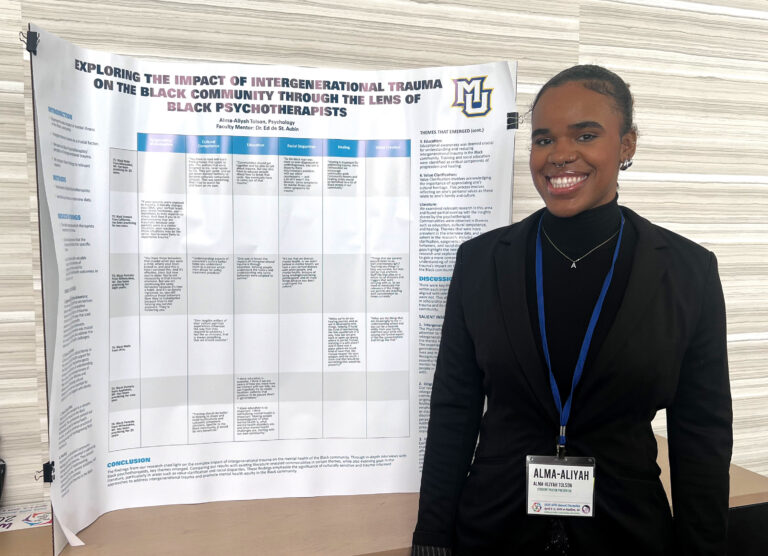Many people first heard of the term “telehealth” roughly three years ago, when the opening stages of the COVID-19 pandemic made in-person health care untenable for large segments of the population. The webcam, primarily thought of as an instrument for chatting with family or conducting a business meeting, became a crucial gateway to the doctor’s office.
It soon became clear that telehealth was not merely a pandemic-era necessity.
“Telehealth was always around but just underutilized,” says Dr. Stacee Lerret, a telehealth and digital care researcher in Marquette’s College of Nursing. “COVID definitely catapulted telehealth more into the public consciousness and it has stayed there.”
Lerret and her colleagues are part of the Marquette Telehealth Accelerator. Founded in 2021 through a $1.5 million private family foundation grant, the accelerator supports research that improves efficacy and equity in virtual care. Nursing professor Dr. Kathy Rapala leads the accelerator’s efforts.
The Marquette Telehealth Research Community functions in tandem with the accelerator to bring together faculty, students and external telehealth practitioners. It meets four times per year to discuss recent developments in the field and to foster collaboration between individuals working on similar problems.
Both the accelerator and the research community have had to scale quickly to meet the pace of industry innovation.
“The utilization of these services had increased rapidly, and the academic community hadn’t really been keeping up with it in terms of research into care standards and ethical practice,” says Dr. Lee Za Ong, a College of Education professor who participates in the research community. “I was interested in starting this community so that we could collaborate, improve the practice of telehealth and even integrate it into our curriculum.”
Marquette’s telehealth efforts have been interdisciplinary. Dr. Karisse A. Callender, assistant professor and director of counselor education in the College of Education, is carrying out her research with the accelerator’s help. Her current study focuses on telehealth delivery of an integrated skills intervention based on Dialectical Behavior Therapy, a type of transdiagnostic treatment and skills training for people who experience emotions more intensely than usual. Callender also studies the impacts of art therapy, with a particular interest in the experiences of Black women receiving this intervention.
Callender received a grant from the accelerator worth up to $20,000 to aid her research project. She says the money will help her compensate study participants and art therapists, secure necessary supplies, and create video modules to guide other clinicians on ways to integrate art therapy with DBT.
“This is really important research and there is a major gap in studying the experiences of Black women with this intervention that the accelerator has alleviated,” Callender says.
“I think the funding is going to allow us to bring a lot more awareness and exposure to the importance of telehealth even outside of a COVID or pandemic lens. Our research will hopefully produce insights that can be used at any point in time.”
Although prescribing medicine and giving medical guidance are the roles of physicians, nurse practitioners and other clinicians, the theories behind telehealth span a much wider group of industries.
“We’re looking into the facilitation of telehealth, not just the medical component of it,” Hostad says. “It’s all about finding ways to connect people with the services that are needed, which is not just a medical issue.”
“One of the biggest purposes of this community is to increase collaboration across different disciplines, which will then make a bigger impact on the health community,” Ong says.
Ong and Dr. Jessica Zemlak from the College of Nursing also received grants for their ongoing studies. Zemlak is researching how telehealth can be used to expand access to HIV prevention medication among marginalized women, while Ong is studying nonverbal telehealth communication. In addition to her accelerator-funded study, Ong is also working with Lerret on a community-based project to expand access to tele-mental health services for young Milwaukee adults living in poverty. That project was one of three Marquette President’s Challenge winners in 2022.
Since research on telehealth and its broad uptake are both relatively new phenomena, those who study it are just starting to figure out best practices. For instance, mental health care providers found that some patients who needed a series of telehealth appointments were terminating their care after only one or two virtual visits. Creating the right mix of in-person and remote care is key to ensuring full completion of a recommended care regimen.
Then there’s the issue of accessibility. Telehealth allows people without consistent transportation to address health issues, but what about people with limited internet access? According to the U.S. Census, nearly 20 percent of Milwaukee households do not have a broadband internet subscription, and more than 10 percent do not have a computer.
Expanding access even further while ensuring better outcomes will take more money, personnel and innovation — three things the telehealth accelerator and its associated research community aim to provide for the long term.
“I think there will always be uptake barriers to telehealth, particularly with different age groups, but overall, it’s been very well received and has become the primary health care choice for many people,” Lerret says.
Adds Hostad: “If our research means these providers are better trained to serve their communities, that only benefits everyone.”
Learn more about the telehealth research community on its website.



